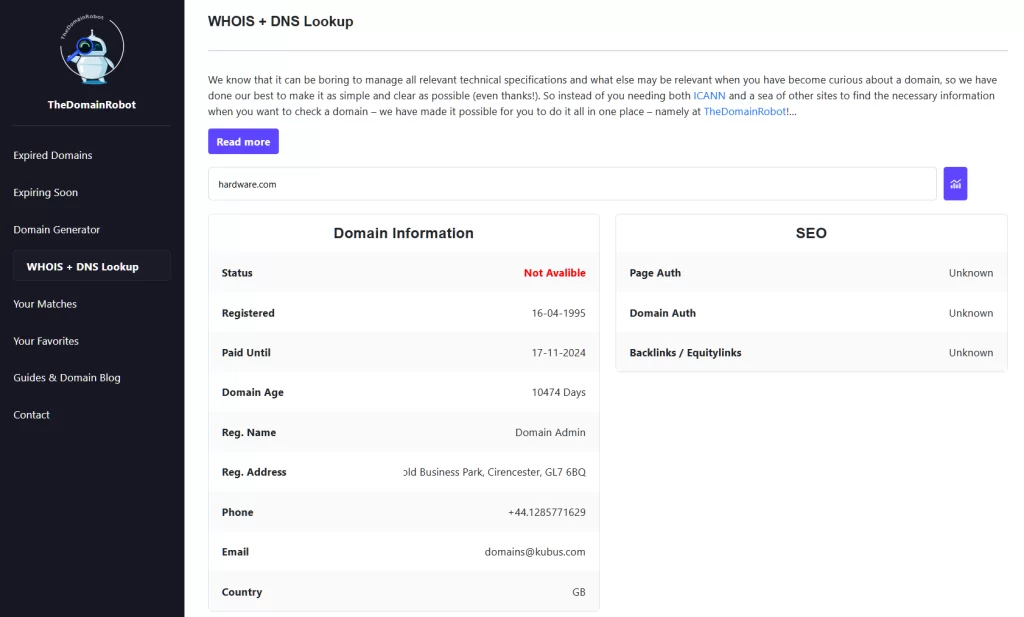Find out Who Owns a Domain – The Best Free Tool in 2024
20-12-2023 - GuidesFind out Who Owns a Domain – The Best Free Tool in 2024
So, you’ve come up with an outstanding domain name that aligns perfectly with your brand or idea. You’re charged up, ready to claim your spot on the internet, only to hit a roadblock, the domain is already taken. While the quickest fix might seem to be choosing a different name, don’t let go of your top pick just yet. There’s a viable path to owning your ideal domain name.
First, do a bit of detective work to uncover who owns it. In 2023, their is a lot of ways to figure out who owns a domain name – people a with a little tech-knowledge can do it from the windows command prompt – else we found the best online tools that provides all the details about the domain’s registration and ownership. Once you’ve got this info, the next step is reaching out. Contacting the owner opens a dialogue where you can express interest in purchasing their domain. Be prepared to negotiate. Remember, the art of making an offer is finding that sweet spot between what you’re willing to pay and what the seller considers a fair price.

Understanding the Importance of Domain WHOIS
When determining who owns a domain, the WHOIS database becomes an indispensable asset – this publicly accessible database catalogs all internet domain names and associated ownership details. If you’re trying to find out who owns domain name, WHOIS provides thorough information including the domain registrar, contact details of the current owner, and sometimes, the administrative and technical contacts.
The utility of WHOIS searches stretches beyond simple inquiries; it serves critical professional needs such as aiding in trademark enforcement, facilitating domain purchasing negotiations, or supporting legal endeavors by revealing who owns this domain. For businesses contemplating a domain acquisition, one of the first steps in the process is often to find out who owns the domain name, so the initial contact can be made.
Additionally, WHOIS data offers insights into the domain’s registration status, indispensable for those seeking to purchase a domain or verify its legitimacy against fraudulent uses.
Navigating the WHOIS Database
To launch a WHOIS search, one must utilize one of the many WHOIS lookup tool that exists – into which you enter the domain name of interest – upon entering the domain, the tool pulls data from a registry, displaying ownership details such as who owns the domain, contact information, registration date, expiration date and so on.
The only tool WHOIS lookup tool you ever need
When it comes to understanding domain ownership and the details behind the elusive “who owns a domain name” question, having a reliable, powerful, and user-friendly WHOIS lookup tool is essential – our proprietary WHOIS tool stands out as the single resource you’ll ever need for all your domain investigative needs.
Our tool is designed with a focus on simplicity and effectiveness – whether you’re a seasoned professional or a individual, aiming to find out who owns a domain, our service delivers comprehensive results with ease. We recognize the varying needs of our users, from legal experts tracing the ownership for intellectual property cases, digital marketers researching for potential domain acquisitions, to cybersecurity professionals keeping tabs on domain credibility.
Moreover, our WHOIS tool prides itself on its speed and accessibility – time is of the essence in our fast-paced digital world, and that’s why our tool is engineered to swiftly produce the answers to query – no more waiting around; get instant, authoritative results with just a few clicks. In essence, our WHOIS lookup tool embodies the perfect blend of fast efficiency and accuracy.

TheDomainRobot – WHOIS Lookup
How to use our WHOIS lookup
1) Go to Thedomainrobot.com WHOIS+DNS lookup
2) In the input field, type the domain name you are looking to find contact information for
3) After typing in the domain name, press enter or the search icon next to the input field
4) After a few seconds, all available information should now be displayed on the site – including contact-, SEO-, Sever- and DNS-information
Privacy Concerns and WHOIS Protection Services
The privacy aspects of domain registration have prompted the development of WHOIS protection services. These services allow domain owners to maintain privacy by shielding their personal information from the WHOIS database queries when people are trying to find out who owns a domain. WHOIS protection services substitute a domain owner’s private contact information with the details of a proxy provider. While this means individuals seeking to find out who owns a domain can identify the proxy service involved, the actual domain owner’s information remains shielded, balancing the need for privacy with the demand for ownership transparency required for legitimate uses.
When WHOIS Data Isn’t Enough – Alternative Strategies
There are moments when the WHOIS database doesn’t yield the comprehensive answers required for queries such as who owns the domain name – this is where alternative strategies become indispensable. When WHOIS protection services conceal the owner’s details or inaccuracies exist in the data, additional tactics must be deployed to uncover the information.
Engaging in research across various platforms can be fruitful – analyzing the content and metadata on the domain itself can offer clues about the proprietor – even social media can sometimes reveal associations with the domain. These methods can be particularly useful when striving to find who owns domain names. Networking within industry circles might also offer insights into domain ownership that WHOIS cannot. Reaching out to domain brokers, who often have insider knowledge about high-profile domain movements, can sometimes also help resolve the mystery of domain ownership.
In instances where official registry data is masked or incomplete, turning to these alternative strategies to deduce who owns a domain name is an essential skill for digital detectives. Diversifying one’s approach in identifying domain ownership is the key to success when traditional pathways, such as WHOIS, fall short.
